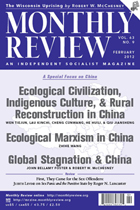‘Global sustainability’ wilts in South Africa’s political hot air

By Patrick Bond, Durban
Romania: Mass protests then and now

Protesters shout as a background banner reads "Freedom, Early Elections" during an anti-government rally in Bucharest, January 24, 2012.
By Rupen Savoulian
February 15, 2012 -- Antipodean Athiest, submitted to Links International Journal of Socialist Renewal by the author -- Back in 1989, Romania was gripped by mass protests, led by miners, against the corrupt and authoritarian regime of Nicolae Ceausescu. The protests in Romania were part of the generalised "Velvet Revolution" against the dictatorial, bureaucratised, deformed workers’ states in Eastern Europe.
No war, no sanctions, no intervention in Iran!

Statement by the Stop the War Coalition (Sydney, Australia)
February 14, 2012 -- The Stop the War Coalition opposes the use of sanctions or military action against Iran by the United States or Israel. These are clear violations of international law.
We oppose all nuclear proliferation.
We oppose Australian support for intervention against Iran.
Despite the lies of the United States and Israel, Iran does not possess a nuclear weapons’ capacity.
The International Atomic Energy Agency, which regularly monitors Iran’s nuclear installations, has found no evidence that Iran is preparing to construct any nuclear weapons. However Iran, as a signatory to the Nuclear Non-Proliferation Treaty, has the legal right to develop nuclear facilities for peaceful purposes.
Even the US has admitted that Iran does not have a nuclear weapon. US Defence Secretary Leon Panetta said in January that Iran was not trying to create a nuclear weapon.
Thailand: Free Somyot Pruksakasemsuk!

[More background information is available here.]
By Choo Chon Kai
February 13, 2012 --The Socialist Party of Malaysia (PSM) expresses its solidarity with labour activist Somyot Pruksakasemsuk, who has been imprisoned without bail since April 30, 2011, and who faces charges under lèse-majesté law. We are deeply concerned over his continuous imprisonment, transferring of prisons and numerous denial of bail requests.
Somyot is known for his tireless work in the workers' movement and the establishment of democratic trade unionism in Thailand. In 2007 he became editor of the Voice of Taksin magazine (now called Red Power), a political publication opposed to the 2006 military coup. Somyot is the chair of Union of Democratic Labour Alliance and the leader of 24th of June for Democracy Group which was formed in the aftermath of the September 2006 military coup.
Syria needs solidarity not Western intervention!

Statement by the Socialist Alliance (Australia)
Behind capitalism's destructive car mania

Stop Signs: Cars & Capitalism ― On the Road to Economic, Social & Ecological Decay
By Bianca Mugenyi & Yves Engler
RED Publishing & Fernwood Publishing
2011, 259 pages
February 5, 2012 -- Green Left Weekly -- The car, say Canadian authors Bianca Mugyenyi and Yves Engler, who took a bus ride across the United States, is a doomed jalopy going nowhere. It fails, especially in the “home of the car”, on every green count. (Watch the authors discuss their book HERE.)
Cars are the single largest contributor to US noise pollution and 40,000 people in the US die from car accidents each year (one million across the globe).
Australia: Left-Green unity is an objective necessity

February 4, 2012 -- Green Left Weekly -- Rupert Murdoch's flagship newspaper, The Australian, has been on a campaign to destroy the Australian Greens because the party represents a big electoral break from the two-parties-for-capitalism system that has dominated Australian politics for more than a century. In the past two weeks, this campaign has been hyped into McCarthyite Cold War hysteria.
Pierre Bourdieu, a thinker of emancipation

Pierre Bourdieu.
By Dimitris Fasfalis
February 3, 2012 – Links International Journal of Socialist Renewal -- Ten years after his death, Pierre Bourdieu’s work and commitments are commemorated throughout the world by friends and foes alike. Le Monde, for instance, described him as a “classic thinker”: second-most quoted author of the academic world after Michel Foucault.
Academia thus recognises Bourdieu as a major sociologist of the 20th century whose concepts (habitus, fields, types of capital, symbolic violence) have become pillars of the social sciences. Few voices, however, have reclaimed Bourdieu’s radical legacy, while his work is of great interest for all those committed to emancipation.[1]
Pablo Solon on Rio+20: For an international campaign against the commodification of nature

By Pablo Solon


